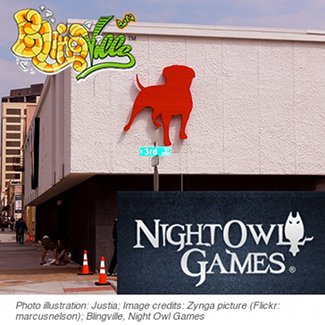 Can gaming company Zynga successfully obtain trademark rights to all things ending in ville, the French word for a town or village?
Can gaming company Zynga successfully obtain trademark rights to all things ending in ville, the French word for a town or village?
Answering that question is a task facing two federal courts.
Before it launched its billion dollar IPO, the San Francisco-based tech company threatened to sue computer game makers for having product names containing the ‘ville’ suffix.
Rather than accede to Zynga’s demands, game makers in West Virginia and Texas preemptively sued Zynga for court declarations that their game names — Blingville and Dungeonville — do not infringe any of the company’s trademark rights.
The problem with Zynga’s ‘ville’ threats, however, are that they can trample the intellectual property of others with pre-existing names, or other companies’ games with the suffix.
Will Dr. Suess’s Whoville, the imaginary town of Hooterville from two TV sitcoms, historic Vaudeville theatre traditions, and depression-era Hooverville shanty towns all be the subject of Zynga trademark claims?
Where will Zynga and federal courts draw the line?
Blingville
Blingville sued Zynga in January 2011 after receiving a barrage of cease-and-desist letters from the game maker’s lawyers.
The company’s attorneys alleged that “as a result of Zynga’s extensive marketing efforts and commercial success, the ‘VILLE Family of Marks is strongly identified by consumers with Zynga’s games and reputation for quality.”
Choosing to fight, Blingville sued Zynga, saying that it acquired the domain name blingville.com from another company which “first began using the name and mark ‘Blingville'” in October 2004.
You can read Blingville’s complaint below, and browse the case docket here:
Blingville, LLC v. Zynga, Inc.
Dungeonville
Zynga took a similar approach against Night Owl Games, maker of Dungeonville. Zynga’s lawyers told the Texas gaming company that it was opposing the Dungeonville trademark application filed with the USPTO.
Night Owl games lawyer floated a pre-litigation settlement proposal to Zynga’s lawyer to resolve the dispute:
I’ve spoken with my clients. They are willing to forego putting “Dungeonville” on Facebook or any other social network if Zynga is also willing to forego the same. In short, nobody puts up a Dungeonville on those sites. (Source: Exhibit ‘A’ to complaint below)
Zynga’s lawyer responded that Zynga “would never agree to limit their ability to offer any VILLE formative marks going forward,” even though they did not currently have plans to offer a “Dungeonville” game.
Night Owl Games filed a trademark lawsuit against Zynga in November 2011 (see below)
Zynga History of IP Spats
At least one analysis of Zynga’s success noted that quite a few of the company’s products were built on the backs of others’ intellectual property.
For example, Mob Wars creator David Maestri and his company Psycho Monkey, LLC sued Zynga for copyright infringement in 2009, charging that Zynga created Mafia Wars by “intentionally and deliberately clon[ing] Mob Wars” after talks to acquire the game fell through. Zynga settled the lawsuit for a reported $7-$9 million.
The Learning Company sued Zynga for trademark infringement in May 2011, charging that the gaming company intended to take a “free-ride” on the goodwill and notoriety associated with its The Oregon Trail game when Zynga introduced Frontierville’s Oregon Trail. Days later, Zynga reportedly hinted to users on its Web forum that it would no longer use the words “Oregon Trail” in its game. The case, however, is still pending.
Where do you think the line should be drawn over a company’s product names with a commonly used suffix in them?
Subscribe to Justia’s FREE weekly intellectual patent case opinion summaries here.
